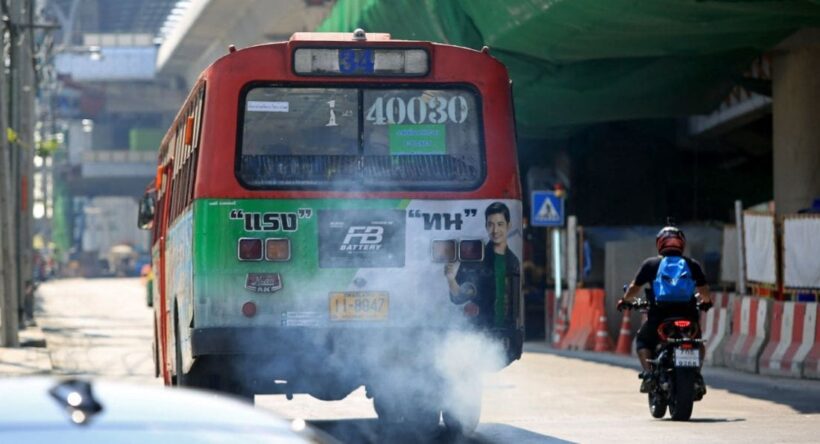Bangkok smog: Diesel buses and vehicles key problem

by Wichit Chaitrong
“The problem is the estimated 2.5 million diesel-powered trucks and buses still on city roads.”
Experts are saying this morning that, given the problems in recent weeks with Bangkok’s smog, the national government’s pursuit of a “low-carbon economy” has fallen short of needs. They are recommending higher taxes on “dirty fuel” and a reduction in the number of vehicles on city streets.
Like other countries, Thailand has incorporated the low-carbon economy model in policies, aiming for sustainable development and better public health. But, in reality, the necessary changes have not taken effect.
The Finance Ministry has already introduced excise taxes on vehicles that vary with emission levels and successive governments have endorsed railway projects such as the mass transit system in Bangkok. The Energy Ministry plans to use more renewable-energy fuels to produce electricity in place of natural gas and coal.
Praipol Koomsup, an economist specialising in energy issues, says the high level of air pollution in Bangkok indicates that that the country has not yet done enough to make the low-carbon economy a reality.
One of several key contributors to the pollution problem is the estimated 2.5 million diesel-powered trucks and buses still on city roads. Diesel engines produce a significant amount of the PM2.5 particulate matter – a big contributor to the health issues related to Bangkok’s smog.
Praipol backs the idea of government subsidies for people willing to buy electric vehicles, the cost of which remains high.
“The government plans to increase the amount of renewable fuel for producing electricity from about 10 per cent to 20 per cent in the next 20 years. That is our target and we need to do a lot to achieve it.”
Thanawat Polvichai, director of the Economic and Business Forecasting Centre at the University of the Thai Chamber of Commerce, estimated that the air pollution could cost Bangkok businesses 5 billion-10 billion baht because, among other issues, no one wants to linger at open-air food stalls.
But Thanawat expects the crisis’ impact on the overall economy to be short-lived.
Speaking at a recent Thailand Development Research Institute seminar on “air pollution as a negative impact of development”, Adis Israngkura, an economist involved in national resources and the environment, urged the government to raise the tax ante.
“It should review the excise tax system and make it clear to people that pollution will be taxed heavily to discourage the use of dirty fuels such as diesel.”
But Adis believes the government is on the right track with its policies on sustainable development, but it needs to do more. PM Prayut Chan-o-cha chairs a committee overseeing the effort, he noted, but “Prayut could take more action”.
SOURCE: The Nation
Latest Thailand News
Follow The Thaiger on Google News:


























